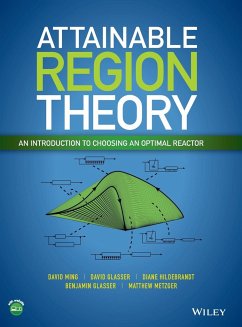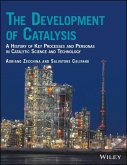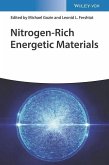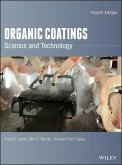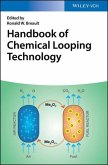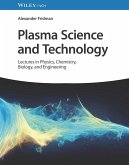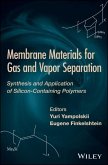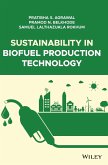David Ming, David Glasser, Diane Hildebrandt
Attainable Region Theory
An Introduction to Choosing an Optimal Reactor
David Ming, David Glasser, Diane Hildebrandt
Attainable Region Theory
An Introduction to Choosing an Optimal Reactor
- Gebundenes Buch
- Merkliste
- Auf die Merkliste
- Bewerten Bewerten
- Teilen
- Produkt teilen
- Produkterinnerung
- Produkterinnerung
Learn how to effectively interpret, select and optimize reactors for complex reactive systems, using Attainable Region theory _ Teaches how to effectively interpret, select and optimize reactors for complex reactive systems, using Attainable Region (AR) theory _ Written by co-founders and experienced practitioners of the theory _ Covers both the fundamentals of AR theory for readers new to the field, as we all as advanced AR topics for more advanced practitioners for understanding and improving realistic reactor systems _ Includes over 200 illustrations and 70 worked examples explaining how AR…mehr
Andere Kunden interessierten sich auch für
![The Development of Catalysis The Development of Catalysis]() Adriano ZecchinaThe Development of Catalysis141,99 €
Adriano ZecchinaThe Development of Catalysis141,99 €![Nitrogen-Rich Energetic Materials Nitrogen-Rich Energetic Materials]() Nitrogen-Rich Energetic Materials112,99 €
Nitrogen-Rich Energetic Materials112,99 €![Organic Coatings Organic Coatings]() Frank N. JonesOrganic Coatings215,99 €
Frank N. JonesOrganic Coatings215,99 €![Handbook of Chemical Looping Technology Handbook of Chemical Looping Technology]() Handbook of Chemical Looping Technology121,99 €
Handbook of Chemical Looping Technology121,99 €![Plasma Science and Technology Plasma Science and Technology]() Alexander FridmanPlasma Science and Technology72,99 €
Alexander FridmanPlasma Science and Technology72,99 €![Membrane Materials for Gas and Separation Membrane Materials for Gas and Separation]() Membrane Materials for Gas and Separation209,99 €
Membrane Materials for Gas and Separation209,99 €![Sustainability in Biofuel Production Technology Sustainability in Biofuel Production Technology]() Pratibha S. AgrawalSustainability in Biofuel Production Technology187,99 €
Pratibha S. AgrawalSustainability in Biofuel Production Technology187,99 €-
-
-
Learn how to effectively interpret, select and optimize reactors for complex reactive systems, using Attainable Region theory
_ Teaches how to effectively interpret, select and optimize reactors for complex reactive systems, using Attainable Region (AR) theory
_ Written by co-founders and experienced practitioners of the theory
_ Covers both the fundamentals of AR theory for readers new to the field, as we all as advanced AR topics for more advanced practitioners for understanding and improving realistic reactor systems
_ Includes over 200 illustrations and 70 worked examples explaining how AR theory can be applied to complex reactor networks, making it ideal for instructors and self-study
_ Interactive software tools and examples written for the book help to demonstrate the concepts and encourage exploration of the ideas
_ Teaches how to effectively interpret, select and optimize reactors for complex reactive systems, using Attainable Region (AR) theory
_ Written by co-founders and experienced practitioners of the theory
_ Covers both the fundamentals of AR theory for readers new to the field, as we all as advanced AR topics for more advanced practitioners for understanding and improving realistic reactor systems
_ Includes over 200 illustrations and 70 worked examples explaining how AR theory can be applied to complex reactor networks, making it ideal for instructors and self-study
_ Interactive software tools and examples written for the book help to demonstrate the concepts and encourage exploration of the ideas
Produktdetails
- Produktdetails
- Verlag: Wiley / Wiley & Sons
- Artikelnr. des Verlages: 1W119157880
- 1. Auflage
- Seitenzahl: 352
- Erscheinungstermin: 10. Oktober 2016
- Englisch
- Abmessung: 286mm x 221mm x 24mm
- Gewicht: 1187g
- ISBN-13: 9781119157885
- ISBN-10: 1119157889
- Artikelnr.: 44675710
- Verlag: Wiley / Wiley & Sons
- Artikelnr. des Verlages: 1W119157880
- 1. Auflage
- Seitenzahl: 352
- Erscheinungstermin: 10. Oktober 2016
- Englisch
- Abmessung: 286mm x 221mm x 24mm
- Gewicht: 1187g
- ISBN-13: 9781119157885
- ISBN-10: 1119157889
- Artikelnr.: 44675710
David Ming holds a B.Sc. and Ph.D. in chemical engineering from the University of the Witwatersrand, Johannesburg. His research interests involve using AR theory to optimize chemical reactors, including batch reactors, and AR numerical methods. David Glasser is a Professor of Chemical Engineering and co-director of the Material and Process Synthesis (MaPS) research unit at the University of South Africa (UNISA). He was Head of Department of Chemical Engineering, and Dean of the Faculty of Engineering at University of the Witwatersrand, and is one of the co-founders of AR theory. He holds a B.Sc. in chemical engineering from University of Cape Town, and a Ph.D. in chemical engineering from Imperial College. Diane Hildebrandt is a Professor of Chemical Engineering and co-Director of the MaPS research unit at UNISA. She was the first woman in South Africa to be appointed a full professor of Chemical Engineering when she was the Unilever Professor of Reaction Engineering at the University of the Witwatersrand, and is also a co-developer of AR theory. She holds a B.Sc., M.Sc. and Ph.D. in chemical engineering from University of the Witwatersrand. Her research area is the reduction of CO2 emissions through the design of energy efficient processes. Benjamin Glasser is a Professor of Chemical and Biochemical Engineering at Rutgers University, New Jersey, USA. He holds a B.Sc. and M.Sc. in chemical engineering from University of the Witwatersrand, and a Ph.D. in chemical engineering from Princeton University. His research interests include heat and mass transfer, multiphase reactors and particle technology applied to chemical and pharmaceutical manufacturing. Matthew Metzger is a Senior Scientist at Merck & Co., Inc. He has co-authored over 14 publications, holds a B.S. in chemical engineering from Lafayette University, and a Ph.D. in chemical engineering from Rutgers University.
Preface xi
Acknowledgments xiii
Prior Knowledge xiv
How this book is Structured xv
Software and Companion Website xvii
Nomenclature xix
SECTION I BASIC THEORY 1
1 Introduction 3
1.1 Introduction 3
1.2 Motivation 3
1.3 Reactor Network Synthesis 8
1.4 Solving the Reactor Network Synthesis Problem 12
1.5 Chapter Review 16
References 17
2 Concentration and Mixing 19
2.1 Introduction 19
2.2 Concentration Vectors and Dimension 23
2.3 Mixing 28
2.4 Chapter Review 47
References 47
3 The Attainable Region 49
3.1 Introduction 49
3.2 A Mixing and Reaction Game 49
3.3 The AR 57
3.4 Elementary Properties of the AR 58
3.5 Chapter Review 61
References 61
4 Reaction 63
4.1 Introduction 63
4.2 Reaction Rates and Stoichiometry 63
4.3 Reaction from a Geometric Viewpoint 66
4.4 Three Fundamental Continuous Reactor Types 73
4.5 Summary 102
4.6 Mixing Temperatures 102
4.7 Additional Properties of the AR 105
4.8 Chapter Review 106
References 107
5 Two-Dimensional Constructions 109
5.1 Introduction 109
5.2 A Framework for Tackling AR Problems 109
5.3 Two-Dimensional Van De Vusse Kinetics 110
5.4 Multiple CSTR Steady States and ISOLAS 125
5.5 Constructions in Residence Time Space 131
5.6 Chapter Review 141
References 141
SECTION II EXTENDED TOPICS 143
6 Higher Dimensional AR Theory 145
6.1 Introduction 145
6.2 Dimension and Stoichiometry 146
6.3 The Three Fundamental Reactor Types Used in AR Theory 159
6.4 Critical DSRs and CSTRs 166
6.5 Chapter Review 189
References 190
7 Applications of AR Theory 191
7.1 Introduction 191
7.2 Higher Dimensional Constructions 191
7.3 Nonisothermal Constructions and Reactor Type Constraints 205
7.4 AR Theory for Batch Reactors 222
7.5 Chapter Review 232
References 233
8 AR Construction Algorithms 235
8.1 Introduction 235
8.2 Preliminaries 235
8.3 Overview of AR Construction Methods 246
8.4 Inside-out Construction Methods 248
8.5 Outside-in Construction Methods 262
8.6 Superstructure Methods 270
8.7 Chapter Review 279
References 279
9 Attainable Regions for Variable Density Systems 281
9.1 Introduction 281
9.2 Common Conversions to Mass Fraction Space 281
9.3 Examples 293
9.4 Chapter Review 298
References 299
10 Final Remarks Further Reading and Future Directions 301
10.1 Introduction 301
10.2 Chapter Summaries and Final Remarks 301
10.3 Further Reading 304
10.4 Future Directions 305
References 307
Appendix A Fundamental Reactor Types 309
A.1 The Plug Flow Reactor 309
A.2 The Continuous-Flow Stirred Tank Reactor 309
A.3 The Differential Sidestream Reactor 310
Appendix B Mathematical Topics 311
B.1 Set Notation 311
B.2 Aspects of Linear Algebra 311
B.3 The Complement Principle 313
References 315
Appendix C Companion Software and Website 317
C.1 Introduction 317
C.2 Obtaining Python and Jupyter 318
Index 321
Acknowledgments xiii
Prior Knowledge xiv
How this book is Structured xv
Software and Companion Website xvii
Nomenclature xix
SECTION I BASIC THEORY 1
1 Introduction 3
1.1 Introduction 3
1.2 Motivation 3
1.3 Reactor Network Synthesis 8
1.4 Solving the Reactor Network Synthesis Problem 12
1.5 Chapter Review 16
References 17
2 Concentration and Mixing 19
2.1 Introduction 19
2.2 Concentration Vectors and Dimension 23
2.3 Mixing 28
2.4 Chapter Review 47
References 47
3 The Attainable Region 49
3.1 Introduction 49
3.2 A Mixing and Reaction Game 49
3.3 The AR 57
3.4 Elementary Properties of the AR 58
3.5 Chapter Review 61
References 61
4 Reaction 63
4.1 Introduction 63
4.2 Reaction Rates and Stoichiometry 63
4.3 Reaction from a Geometric Viewpoint 66
4.4 Three Fundamental Continuous Reactor Types 73
4.5 Summary 102
4.6 Mixing Temperatures 102
4.7 Additional Properties of the AR 105
4.8 Chapter Review 106
References 107
5 Two-Dimensional Constructions 109
5.1 Introduction 109
5.2 A Framework for Tackling AR Problems 109
5.3 Two-Dimensional Van De Vusse Kinetics 110
5.4 Multiple CSTR Steady States and ISOLAS 125
5.5 Constructions in Residence Time Space 131
5.6 Chapter Review 141
References 141
SECTION II EXTENDED TOPICS 143
6 Higher Dimensional AR Theory 145
6.1 Introduction 145
6.2 Dimension and Stoichiometry 146
6.3 The Three Fundamental Reactor Types Used in AR Theory 159
6.4 Critical DSRs and CSTRs 166
6.5 Chapter Review 189
References 190
7 Applications of AR Theory 191
7.1 Introduction 191
7.2 Higher Dimensional Constructions 191
7.3 Nonisothermal Constructions and Reactor Type Constraints 205
7.4 AR Theory for Batch Reactors 222
7.5 Chapter Review 232
References 233
8 AR Construction Algorithms 235
8.1 Introduction 235
8.2 Preliminaries 235
8.3 Overview of AR Construction Methods 246
8.4 Inside-out Construction Methods 248
8.5 Outside-in Construction Methods 262
8.6 Superstructure Methods 270
8.7 Chapter Review 279
References 279
9 Attainable Regions for Variable Density Systems 281
9.1 Introduction 281
9.2 Common Conversions to Mass Fraction Space 281
9.3 Examples 293
9.4 Chapter Review 298
References 299
10 Final Remarks Further Reading and Future Directions 301
10.1 Introduction 301
10.2 Chapter Summaries and Final Remarks 301
10.3 Further Reading 304
10.4 Future Directions 305
References 307
Appendix A Fundamental Reactor Types 309
A.1 The Plug Flow Reactor 309
A.2 The Continuous-Flow Stirred Tank Reactor 309
A.3 The Differential Sidestream Reactor 310
Appendix B Mathematical Topics 311
B.1 Set Notation 311
B.2 Aspects of Linear Algebra 311
B.3 The Complement Principle 313
References 315
Appendix C Companion Software and Website 317
C.1 Introduction 317
C.2 Obtaining Python and Jupyter 318
Index 321
Preface xi
Acknowledgments xiii
Prior Knowledge xiv
How this book is Structured xv
Software and Companion Website xvii
Nomenclature xix
SECTION I BASIC THEORY 1
1 Introduction 3
1.1 Introduction 3
1.2 Motivation 3
1.3 Reactor Network Synthesis 8
1.4 Solving the Reactor Network Synthesis Problem 12
1.5 Chapter Review 16
References 17
2 Concentration and Mixing 19
2.1 Introduction 19
2.2 Concentration Vectors and Dimension 23
2.3 Mixing 28
2.4 Chapter Review 47
References 47
3 The Attainable Region 49
3.1 Introduction 49
3.2 A Mixing and Reaction Game 49
3.3 The AR 57
3.4 Elementary Properties of the AR 58
3.5 Chapter Review 61
References 61
4 Reaction 63
4.1 Introduction 63
4.2 Reaction Rates and Stoichiometry 63
4.3 Reaction from a Geometric Viewpoint 66
4.4 Three Fundamental Continuous Reactor Types 73
4.5 Summary 102
4.6 Mixing Temperatures 102
4.7 Additional Properties of the AR 105
4.8 Chapter Review 106
References 107
5 Two-Dimensional Constructions 109
5.1 Introduction 109
5.2 A Framework for Tackling AR Problems 109
5.3 Two-Dimensional Van De Vusse Kinetics 110
5.4 Multiple CSTR Steady States and ISOLAS 125
5.5 Constructions in Residence Time Space 131
5.6 Chapter Review 141
References 141
SECTION II EXTENDED TOPICS 143
6 Higher Dimensional AR Theory 145
6.1 Introduction 145
6.2 Dimension and Stoichiometry 146
6.3 The Three Fundamental Reactor Types Used in AR Theory 159
6.4 Critical DSRs and CSTRs 166
6.5 Chapter Review 189
References 190
7 Applications of AR Theory 191
7.1 Introduction 191
7.2 Higher Dimensional Constructions 191
7.3 Nonisothermal Constructions and Reactor Type Constraints 205
7.4 AR Theory for Batch Reactors 222
7.5 Chapter Review 232
References 233
8 AR Construction Algorithms 235
8.1 Introduction 235
8.2 Preliminaries 235
8.3 Overview of AR Construction Methods 246
8.4 Inside-out Construction Methods 248
8.5 Outside-in Construction Methods 262
8.6 Superstructure Methods 270
8.7 Chapter Review 279
References 279
9 Attainable Regions for Variable Density Systems 281
9.1 Introduction 281
9.2 Common Conversions to Mass Fraction Space 281
9.3 Examples 293
9.4 Chapter Review 298
References 299
10 Final Remarks Further Reading and Future Directions 301
10.1 Introduction 301
10.2 Chapter Summaries and Final Remarks 301
10.3 Further Reading 304
10.4 Future Directions 305
References 307
Appendix A Fundamental Reactor Types 309
A.1 The Plug Flow Reactor 309
A.2 The Continuous-Flow Stirred Tank Reactor 309
A.3 The Differential Sidestream Reactor 310
Appendix B Mathematical Topics 311
B.1 Set Notation 311
B.2 Aspects of Linear Algebra 311
B.3 The Complement Principle 313
References 315
Appendix C Companion Software and Website 317
C.1 Introduction 317
C.2 Obtaining Python and Jupyter 318
Index 321
Acknowledgments xiii
Prior Knowledge xiv
How this book is Structured xv
Software and Companion Website xvii
Nomenclature xix
SECTION I BASIC THEORY 1
1 Introduction 3
1.1 Introduction 3
1.2 Motivation 3
1.3 Reactor Network Synthesis 8
1.4 Solving the Reactor Network Synthesis Problem 12
1.5 Chapter Review 16
References 17
2 Concentration and Mixing 19
2.1 Introduction 19
2.2 Concentration Vectors and Dimension 23
2.3 Mixing 28
2.4 Chapter Review 47
References 47
3 The Attainable Region 49
3.1 Introduction 49
3.2 A Mixing and Reaction Game 49
3.3 The AR 57
3.4 Elementary Properties of the AR 58
3.5 Chapter Review 61
References 61
4 Reaction 63
4.1 Introduction 63
4.2 Reaction Rates and Stoichiometry 63
4.3 Reaction from a Geometric Viewpoint 66
4.4 Three Fundamental Continuous Reactor Types 73
4.5 Summary 102
4.6 Mixing Temperatures 102
4.7 Additional Properties of the AR 105
4.8 Chapter Review 106
References 107
5 Two-Dimensional Constructions 109
5.1 Introduction 109
5.2 A Framework for Tackling AR Problems 109
5.3 Two-Dimensional Van De Vusse Kinetics 110
5.4 Multiple CSTR Steady States and ISOLAS 125
5.5 Constructions in Residence Time Space 131
5.6 Chapter Review 141
References 141
SECTION II EXTENDED TOPICS 143
6 Higher Dimensional AR Theory 145
6.1 Introduction 145
6.2 Dimension and Stoichiometry 146
6.3 The Three Fundamental Reactor Types Used in AR Theory 159
6.4 Critical DSRs and CSTRs 166
6.5 Chapter Review 189
References 190
7 Applications of AR Theory 191
7.1 Introduction 191
7.2 Higher Dimensional Constructions 191
7.3 Nonisothermal Constructions and Reactor Type Constraints 205
7.4 AR Theory for Batch Reactors 222
7.5 Chapter Review 232
References 233
8 AR Construction Algorithms 235
8.1 Introduction 235
8.2 Preliminaries 235
8.3 Overview of AR Construction Methods 246
8.4 Inside-out Construction Methods 248
8.5 Outside-in Construction Methods 262
8.6 Superstructure Methods 270
8.7 Chapter Review 279
References 279
9 Attainable Regions for Variable Density Systems 281
9.1 Introduction 281
9.2 Common Conversions to Mass Fraction Space 281
9.3 Examples 293
9.4 Chapter Review 298
References 299
10 Final Remarks Further Reading and Future Directions 301
10.1 Introduction 301
10.2 Chapter Summaries and Final Remarks 301
10.3 Further Reading 304
10.4 Future Directions 305
References 307
Appendix A Fundamental Reactor Types 309
A.1 The Plug Flow Reactor 309
A.2 The Continuous-Flow Stirred Tank Reactor 309
A.3 The Differential Sidestream Reactor 310
Appendix B Mathematical Topics 311
B.1 Set Notation 311
B.2 Aspects of Linear Algebra 311
B.3 The Complement Principle 313
References 315
Appendix C Companion Software and Website 317
C.1 Introduction 317
C.2 Obtaining Python and Jupyter 318
Index 321

